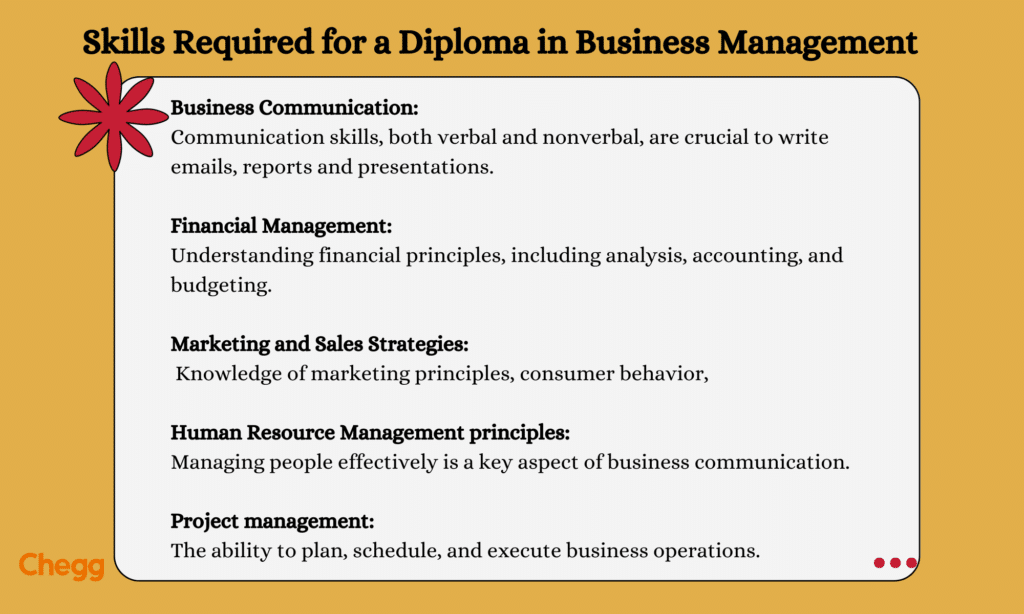

Quick Summary
A Diploma in Business Management equips students with essential skills in management, strategic decision-making, and practical applications, preparing them for dynamic roles in various sectors.
The program’s comprehensive curriculum includes core subjects in marketing, finance, and human resource management, coupled with hands-on learning through industry projects and internships.
Graduates of business management diplomas can pursue diverse career paths across industries, with job titles like Business Manager and Financial Analyst, and competitive salary expectations based on experience and qualifications.
In today’s fast-paced and competitive business world, obtaining a Diploma in Business Management has become increasingly popular among aspiring professionals. Hearing this, it won’t come as a surprise that according to the Bureau of Labor Statistics, employment in management occupations is projected to grow by 5% from 2020 to 2030, adding about 505,000 new jobs to the market.
This credential offers a practical and focused approach to developing essential skills and knowledge necessary for success in various business domains. Whether you are a recent high school graduate or a working professional looking to enhance your qualifications, a Business Management diploma can open doors to exciting career opportunities and provide a solid foundation in business principles.
Let us explore “What is Business Management” and its key features, such as eligibility, application process, top colleges, and job prospects after a diploma in business management.
Related Read: How to Become a Management Consultant

Business management is integral to a company’s oversight and operation. It offers insights into the establishment and performance of different sectors, including marketing and finance. Educational programs in this area impart knowledge on modern business practices, arming students with essential tools required for proficient navigation through today’s business environment.
Through diploma programs that enhance strategic decision-making and business management capabilities, students are primed to become adept managers who tackle challenges effectively. These courses provide an expansive understanding of how businesses operate, empowering graduates with the ability to make well-informed decisions and lead confidently across various position
Upon completing the diploma, students are prepared for entry-level positions in diverse industries such as marketing, finance, human resources, and operations. Graduates can pursue multiple careers in the financial sector. Additionally, the diploma serves as a stepping stone for further studies in business and management, providing a solid foundation for individuals aspiring to advance their education and career in the field.
Please note that the eligibility criteria may vary from institute to institute and change yearly. For exact and updated information, please refer to the institute’s requirements you are interested in.

It is essential to check each college’s specific requirements and guidelines for detailed instructions on the application process, including deadlines and required documents.
The subjects and syllabus of a Diploma in Business Management program play a crucial role in equipping students with the necessary knowledge and skills for a successful career in the business world. Let’s explore important subjects in the Diploma in Business Management program and their significance.

Also Read:
List of Best Diploma Courses After 10th for All Streams

When considering a Diploma in Business Management, choosing a reputable college that provides quality education and prepares students for a successful career is crucial. Here are some top colleges in India offering a Diploma in Business Management:

Recommended Read: Difference Between Diploma and Degree
Earning a Diploma in Business Management opens up many career prospects and job opportunities. Graduates with this diploma possess a strong foundation in business principles, practical skills, and industry-relevant knowledge. Here are some popular career paths to consider:

Analysts gather and analyze data to identify problems, develop solutions, and improve business processes. They play a crucial role in driving organizational growth and efficiency.
Marketing coordinators assist in developing and implementing marketing campaigns, conducting market research, and coordinating promotional activities. They contribute to brand building and customer engagement.
Financial analysts assess financial data, analyze market trends, and recommend investment decisions. They play a vital role in evaluating organizations’ financial health and performance.
Operations managers oversee day-to-day operations, manage resources, and ensure efficiency and productivity. They streamline processes and optimize business operations to achieve organizational goals.
Sales executives are responsible for identifying potential customers, building relationships, and closing deals. They play a critical role in driving sales growth and revenue generation.
Know More About:
Diploma in Information Technology
Course Highlights of Diploma In Pharmacy
With a Diploma in Business Management, you have great career growth prospects. As you gain experience and expertise, you can move up to:
If you have leadership skills and business acumen, you can take on a supervisory role and lead teams to achieve organizational objectives.
If you have extensive experience and industry knowledge, you can move into managerial positions and oversee departments or business units.
The diploma equips you with the skills to start and manage your business. You can leverage your knowledge of business principles, marketing strategies, and financial management to pursue entrepreneurial ventures.
Whether you climb the corporate ladder or start entrepreneurial journeys, Diploma of Business Management graduates have long-term career growth, professional development, and financial success.
A Business Management diploma can be a great educational pathway if you are passionate about business and want to build a successful career. The program has a comprehensive curriculum aligned to industry needs, practical skill development opportunities, and the chance to specialize in areas of interest. A Business Management diploma, with a shorter duration than a degree, allows you to gain the skills and knowledge efficiently.
Considering its flexibility, affordability, and relevance, a business management diploma is a great choice for those looking for a focused and practical business education. Invest in yourself and start your journey by doing a Business Management diploma.
A diploma in business management teaches you to make informed business decisions and manage a company’s operations. These diploma courses are designed to get you ready for further education or employment.
1. Diploma in Financial Management: A financial manager is responsible for providing clients and colleagues with financial advice and support, which helps them make sound business decisions.
2. Diploma in Business Management or Business Administration: A diploma in business administration is a one-year course that teaches you important management skills. The course will teach you how human resources work. It also helps to understand the business cycle.
3. Diploma in Hotel Management: This career path provides good job opportunities in the public and private sectors. Many students enroll in a hotel management program after high school. Because of the course structure, aspirants can be considered professionals after completing the Diploma in Hotel Management course. The course makes them capable of having a good job scope and skills.
This course will teach you what you need to know about products, dealing with customers, and hiring people. Completing this course can increase a company’s input. It will also provide tips on increasing company productivity by utilizing various tried-and-tested methods and techniques.
The two-year diploma courses cover various topics in business management, including marketing education, finance, sales, and government.
Business management involves organizing people and resources to meet a company’s objectives. It involves creating strategies, making decisions, providing leadership, and overseeing daily tasks. Managers handle budgets, build and motivate teams, track progress, and look for improvement areas. Ultimately, the goal is maintaining efficiency and driving success in a competitive market.

Authored by, Amay Mathur | Senior Editor




Amay Mathur is a business news reporter at Chegg.com. He previously worked for PCMag, Business Insider, The Messenger, and ZDNET as a reporter and copyeditor. His areas of coverage encompass tech, business, strategy, finance, and even space. He is a Columbia University graduate.
Editor's Recommendations
Chegg India does not ask for money to offer any opportunity with the company. We request you to be vigilant before sharing your personal and financial information with any third party. Beware of fraudulent activities claiming affiliation with our company and promising monetary rewards or benefits. Chegg India shall not be responsible for any losses resulting from such activities.
Chegg India does not ask for money to offer any opportunity with the company. We request you to be vigilant before sharing your personal and financial information with any third party. Beware of fraudulent activities claiming affiliation with our company and promising monetary rewards or benefits. Chegg India shall not be responsible for any losses resulting from such activities.